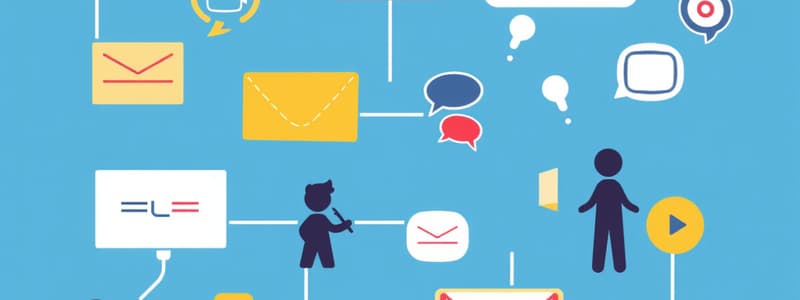Podcast
Questions and Answers
Which of the following is NOT one of the six core skills of deep learning?
Which of the following is NOT one of the six core skills of deep learning?
- Critical Thinking
- Comprehension (correct)
- Creativity
- Collaboration
What is the main purpose of the Data Privacy Act of 2012?
What is the main purpose of the Data Privacy Act of 2012?
- To protect individual personal information (correct)
- To establish copyright laws in the Philippines
- To promote media literacy among individuals
- To regulate the usage of trademarks
Which of the following types of information is classified as Sensitive Information?
Which of the following types of information is classified as Sensitive Information?
- Name and address of an individual
- Email address
- Favorite color
- Social Security Number (correct)
Which of the following best describes Intellectual Property?
Which of the following best describes Intellectual Property?
What does a trademark represent?
What does a trademark represent?
Which of the following statements about copyright is true?
Which of the following statements about copyright is true?
Which law established the Intellectual Property Office in the Philippines?
Which law established the Intellectual Property Office in the Philippines?
What is trademark infringement?
What is trademark infringement?
What is an example of non-verbal communication?
What is an example of non-verbal communication?
Which of the following best describes information literacy?
Which of the following best describes information literacy?
What distinguishes formal communication from informal communication?
What distinguishes formal communication from informal communication?
Which of the following skills is essential for effective information literacy?
Which of the following skills is essential for effective information literacy?
Media literacy primarily involves which of the following abilities?
Media literacy primarily involves which of the following abilities?
What device was invented in 1876 that allows users to have conversations over long distances?
What device was invented in 1876 that allows users to have conversations over long distances?
Which communication revolutionized long-distance messages using electrical signals?
Which communication revolutionized long-distance messages using electrical signals?
Which statement best captures the essence of technology and digital literacy?
Which statement best captures the essence of technology and digital literacy?
What is the first step a person must take to demonstrate information literacy?
What is the first step a person must take to demonstrate information literacy?
Which of the following inventions was the first general-purpose electronic digital computer designed for business?
Which of the following inventions was the first general-purpose electronic digital computer designed for business?
What major advancement in technology during the Electronic Age allowed for the creation of small portable radios?
What major advancement in technology during the Electronic Age allowed for the creation of small portable radios?
Which factor is not considered a component of digital literacy?
Which factor is not considered a component of digital literacy?
Which invention allowed the broadcast of visual images and sound starting in 1941?
Which invention allowed the broadcast of visual images and sound starting in 1941?
What era is characterized by the development and use of personal computers and the Internet?
What era is characterized by the development and use of personal computers and the Internet?
What coding system uses combinations of long and short signals for representation of letters?
What coding system uses combinations of long and short signals for representation of letters?
Which of the following is NOT considered a significant advancement in communication technology?
Which of the following is NOT considered a significant advancement in communication technology?
What defines Industrial Design?
What defines Industrial Design?
Which of the following is a characteristic of geographical indications?
Which of the following is a characteristic of geographical indications?
What is direct plagiarism?
What is direct plagiarism?
Which act defines and addresses cybercrime in the Philippines?
Which act defines and addresses cybercrime in the Philippines?
What is the primary issue associated with digital privacy?
What is the primary issue associated with digital privacy?
What was a significant media development during the Pre-Industrial Age?
What was a significant media development during the Pre-Industrial Age?
Which of the following describes mosaic plagiarism?
Which of the following describes mosaic plagiarism?
What major advancement did Johannes Gutenberg contribute to during the Industrial Age?
What major advancement did Johannes Gutenberg contribute to during the Industrial Age?
Which is considered a type of plagiarism that involves reusing one's own previous work?
Which is considered a type of plagiarism that involves reusing one's own previous work?
What is computer addiction characterized by?
What is computer addiction characterized by?
During which age were Acta Diurna in Rome produced?
During which age were Acta Diurna in Rome produced?
The Digital Divide primarily refers to what?
The Digital Divide primarily refers to what?
What is considered cyberbullying?
What is considered cyberbullying?
Which of the following best characterizes media ethics?
Which of the following best characterizes media ethics?
Flashcards are hidden until you start studying
Study Notes
Communication
- Communication is the exchange of information, including ideas, opinions, thoughts, and feelings.
- Types Based on Channels:
- Verbal Communication: Oral and written forms.
- Non-Verbal Communication: Includes body language, facial expressions, signs, and symbols.
- Types Based on Style and Purpose:
- Formal Communication: Adheres to predefined organizational channels.
- Informal Communication: Casual and personal, lacking formal rules.
Media and Literacy
- Media: Channels used for transmitting messages.
- Literacy: The ability to read, write, and understand specific subjects.
- Media Literacy: Skills in analyzing and synthesizing media messages.
- Information Literacy: Skills to recognize, evaluate, and apply information effectively.
- Key skills include identifying, retrieving, evaluating, synthesizing, and presenting information.
Technology and Digital Literacy
- Digital Literacy: The ability to navigate, evaluate, and create content online using internet tools.
- Core Skills: Character, citizenship, collaboration, communication, creativity, and critical thinking.
Laws and Regulations
-
Data Privacy Act of 2012: Protects personal information in government and private sectors.
- Personal Information: Data that can identify an individual.
- Sensitive Information: Includes race, religion, health records, etc.
-
Intellectual Property Code (RA 8293): Establishes protections for intellectual property including copyrights, patents, and trademarks.
- Copyright: Rights of creators over their original works.
- Patent: Exclusive rights for inventions.
- Trademark: Distinguishes goods/services of one enterprise.
- Trademark Infringement: Unauthorized use that causes confusion.
-
Electronic Commerce Act of 2000: Recognizes the use of electronic transactions and imposes penalties for violations.
Plagiarism
- Definition: Intellectual dishonesty involving misrepresentation of someone else's work as one's own.
- Types of Plagiarism:
- Direct Plagiarism: Copying without attribution.
- Inaccurate Authorship: Wrongly acknowledging contributions.
- Mosaic Plagiarism: Borrowing phrases without quotation marks.
- Paraphrasing Plagiarism: Rewording someone else's ideas without credit.
- Self-Plagiarism: Reusing one's prior work without permission.
Cybercrime
- Cybercrime Prevention Act of 2012: Defines cybercrime, policies for prevention, investigation, and penalties.
- Cyberbullying: Bullying through digital platforms.
- Computer Addiction: Overuse of computers impacting daily life.
- Digital Divide: Economic inequalities in ICT access and knowledge.
Media Ethics
- Focuses on ethical principles and standards within various media forms, including broadcast, print, and online.
Historical Media Evolution
-
Pre-Industrial Age:
- Cave paintings, Mesopotamian tablets, and Egyptian papyrus were early forms of communication.
-
Industrial Age:
- Printing press facilitated mass book production; newspapers became daily information sources.
-
Electronic Age:
- Introduction of transistors, radios, and television revolutionized communication.
-
Information Age:
- The internet transformed communication into a global, fast-paced digital environment, with advancements in personal computing and digital technologies.
Studying That Suits You
Use AI to generate personalized quizzes and flashcards to suit your learning preferences.




